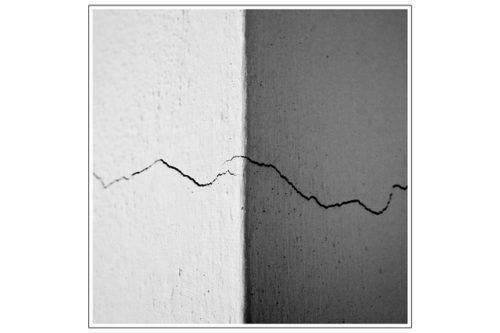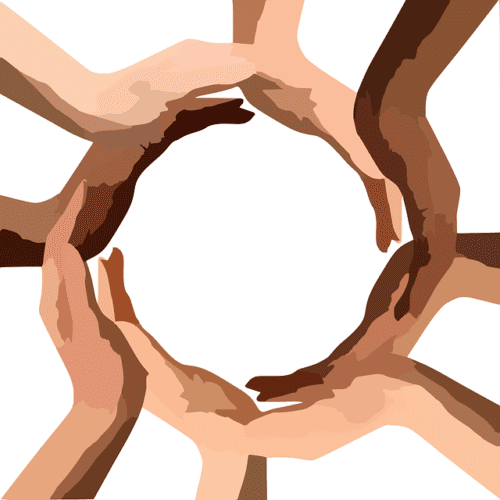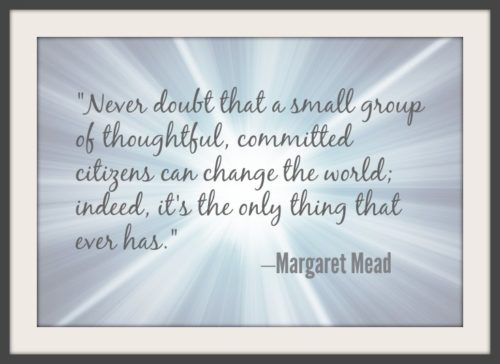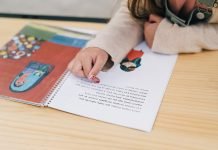Our country is in turmoil.
News stories pile up on top of each other, tragedies upon tragedies, more pain and violence than anyone can fully understand or bear. People are hurting, desperate, misunderstood, afraid, and marginalized. There is a virtual war, in which real, human people are assembling into rigid, polarized groups and launching angry, accusatory words at each other. There is an actual war, the physical manifestation of the hurt and desperation boiling under the surface for far too long: the violence and the shootings, the riots and terror. The worst part is, each one perpetuates the other, and we will not succeed in solving one without an end to the other.
It seems like a problem too deep to understand, a task too challenging to tackle, an obstacle too difficult to overcome. Maybe it is. But we can’t keep claiming that someone else is the problem. We can’t keep casting the blame elsewhere, naming “the other” as the racist, the bigot, the problem that needs fixing.

As moms, it’s our job to guide our children when they make mistakes, stray from the path, or commit errors in their interactions with others. We teach our children to follow this script when a problem has occurred: Confess, apologize, do better. We teach them to own up to what they have done and claim responsibility for the mistakes they have made. We encourage them to apologize, asking for forgiveness and admitting responsibility to the people they have offended or hurt. And we reinforce the notion that to be truly sorry means to work towards change. We teach this, but do we do it?
Our kids are watching. Maybe they aren’t paying attention yet, maybe they are too young or tuned out right now, but the pages of history are being written at this very moment. Someday, our kids will hear about this time, and they will demand answers.
What did you do about it?
How could this have happened?
Why didn’t you stop it?
As mothers, we will have to answer to that. We have screwed up. It’s time to say it out loud.
Confess
Can we admit that? Is it just too scary to claim it? How much longer can we pretend it doesn’t affect us, it isn’t our problem, or it’s too big to do anything about?
We are a group of moms, and we take responsibility for the ways we have failed and contributed to racial tensions, division, ignorance, and misunderstanding of our own white privilege. Please accept our apologies. We will pursue change.
Apologize
Fellow mamas, we, of all people, should be well-versed in what to do when we have screwed up. Will you join us? This simple paradigm is one that we’ve taught hundreds of times before: Confess, Apologize, Change. And now we are going to model it.
**Thank you to the mothers who have joined our efforts and contributed their thoughts here.
“In efforts to shelter my children I have failed at exposing them to diversity, and I avoid the hard conversations. I don’t know if I should encourage them to see everyone as ‘the same’ or to notice and appreciate the differences. I am sorry that my fears have kept me from creating positive change. I’m sorry that I often ignore the news when it gets too much to handle. I will start setting my discomfort aside and engaging in conversations. I will do more listening so I can better prepare my daughters for the real world. I will try to help create the world we all want for our children.” –Michele
“I’m afraid to share social media posts about violent and racially charged topics, because I worry that I’ll just be adding fuel to the fire and don’t want people to misinterpret my view point, nor do I want to unintentionally offend people. I’m sorry I don’t speak up more, and will do better about lending my voice in a helpful way.” –Becky
“I am afraid to say or share anything in conversations or social media because I feel so inadequate, and I am embarrassed by the privilege our society offers me and the benefit to turn away. I am sorry. I take responsibility for my ignorance and lack of action. My change will start by intentionally being more aware and having conversations with my children about our place in this society, in our neighborhood, in their schools.” –D
“I don’t bring up racism in our house because I’ll have to start with confronting my husband’s perspective first, and it’s never an easy topic to discuss. I am deeply sorry, and conversations have already started about the kind of world we want for our son given the current social situations. We both want better for him, and that starts with us being more open, honest, and creators of change.” –Anon
“I find myself name calling in front of my children when I get upset while driving. This shows a lack of respect for others and a wrongful solution when dealing with problems. I’m sorry that I let my anger control my judgments at time, and I apologize that I choose hurtful words to express my feelings. I want to lead by a better example for my children and show them that emotional and physical abuse is NEVER the answer.” –Mary
“I’m sorry that I haven’t done as good a job as my own parents did in getting my kids involved as young activists. I grew up going to all kinds of demonstrations and protests as a kid, including demonstrations focused on racial issues and love/unity while living in a community with a very strong KKK presence. Because I haven’t gotten my family involved in activism, I worry that my kids will not understand how important it is to stand up for what they believe in and to stand up for those who are marginalized or not able to make their voices heard. Going forward, I’m going to look for opportunities to get my family involved in a more concrete way so my kids can see that they can make a difference and work toward the kind of loving and accepting society that all people deserve to live in.” –Laura
“We often “gloss over” discussions about the racial tensions currently plaguing our country when our 5-year-old asks about events covered on TV. I’m sorry that we tend to take the easy route and say things like, “Those people are mad,” or “That’s because some people don’t like police officers.” Moving forward, I will be more intentional about embracing the teachable moments and make sure my son has an age-appropriate understanding of things he asks questions about.” –Sara
“I’ve been married for nearly 9 years, and this summer is the first time we’ve really sat down and had an honest conversation about race, privilege, and how we can raise our sons to recognize how they have benefited from bias and societal structures. I apologize for being de facto part of the problem by ignoring the problem, and I plan to keep the conversation going at home and in other areas of our lives.” –Sarah
“My family is isolated and segregated from diversity in many ways. Sometimes I focus so much on my children’s individual growth that I fail to raise them to be outwardly-focused leaders, agents of change, and love-givers towards other people. I am deeply sorry. I will speak out. I will seek diversity, in books, in experiences, and in our community. I will care more about kindness, love, and equity than intelligence and personal success.” –Lianna
Change
In a world full of racial tensions, violence, and segregation, we must raise our children to be color-sensitive, color-informed, and color-connected, NOT color-blind. We can be scared, but we can’t be silent. We can do the wrong thing, but we can’t do nothing. If we make mistakes, let it be because we were pursuing truth and love, not because we were too afraid to begin.
We know we are privileged. We know we are ignorant. We know our voices are insignificant, and our ideas are not going to solve and heal like we wish they could. Even if the words we say are feeble or unintentionally offensive, we would rather speak up than remain silent. We would rather try and fail than not try at all. Let us all stand strong as mothers, committing ourselves wholeheartedly to being the change we desire for the world.

Iowa City Organizations
- SURJ (Standing Up for Racial Justice)
- Coalition for Racial Justice
- Iowa City Black Voices Project
- PEACE Iowa (Peace Education and Action Center of Eastern Iowa)
- Racial Equity Tools (Nationwide library of resources)
Add your voice below, if you would like to participate in our “Confess, Apologize, Change” movement.












Beautifully written. Thank you.
I love this. Very inspiring and an excellent reminder to lead by example.